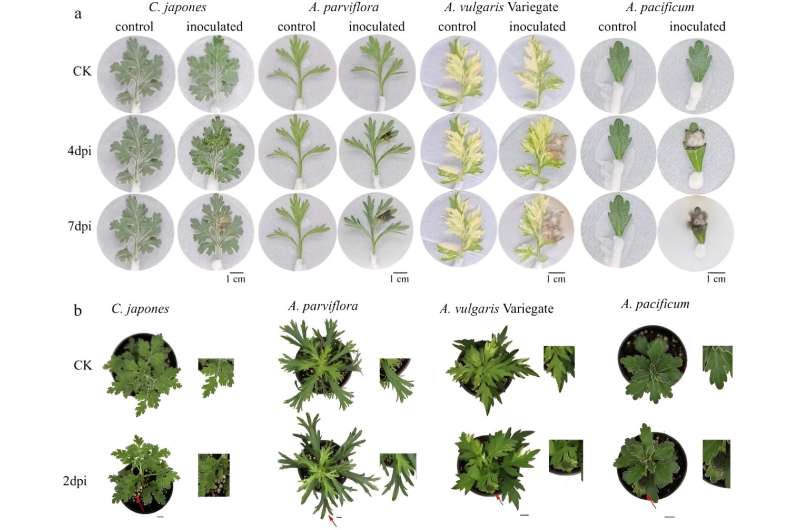
Differences in disease phenotype of different plants after inoculation. Credit: Ornamental Plant Research
Chrysanthemum, celebrated for its ornamental, medicinal, and beverage value, faces significant threats from bacterial and fungal infections, particularly black spot disease caused by Alternaria alternate, which leads to severe economic losses. Current research has focused on developing resistant germplasm as an eco-friendly alternative to pesticides.
Despite these efforts, the search for germplasm with exceptional disease resistance is ongoing, and the integration of physical and chemical plant defenses and secondary metabolites into breeding strategies remains underexplored. Therefore, further investigation into how these defenses contribute to resistance against black spot disease in chrysanthemum is of great importance to enhance breeding efforts for disease-resistant cultivars.
Ornamental Plant Research has recently published a paper titled “Genetic resources resistant to black spot (Alternaria alternate) identified from Chrysanthemum-related genera and potential underlying mechanisms.”
In this study, researchers employed simplified detached leaf inoculation assay and whole plant inoculation assay to assess the resistance of 14 chrysanthemum-related genera (CRG) to black spot disease. After artificial inoculation and identification based on disease indices, two disease-resistant germplasm resources (R), 11 moderately resistant materials (MR), and one sensitive (S) material were obtained.
The results showed good reproducibility and correlation between methods, highlighting C. japonese and A. parviflora as resistant, and revealing significant physical and chemical defense mechanisms contributing to disease resistance.
Further analysis focused on the leaf epidermis structure of resistant and susceptible germplasms, revealing notable differences in trichome morphology and density, stomatal characteristics, and wax content, which correlated with resistance levels. For instance, R1 had significantly higher trichome density and wax content, contributing to its resistance. Additionally, volatile organic compounds (VOCs) analysis indicated that resistant germplasms produced higher terpenoid content, with Germacrene D significantly inhibiting A. alternata growth, suggesting its role in chemical defense.
In conclusion, the study not only identified C. japonese and A. parviflora as resistant through a combination of physical (trichome density, stomatal closure, wax content) and chemical defenses (high VOCs and terpenoid content) but also demonstrated the importance of both types of defenses in disease resistance. These findings enhance our understanding of CRG resistance to black spot disease, offering insights into breeding strategies and the potential use of physical and chemical traits as markers for disease resistance.
More information:
Qingling Zhan et al, Genetic resources resistant to black spot (Alternaria alternate) identified from Chrysanthemum-related genera and potential underlying mechanisms, Ornamental Plant Research (2023). DOI: 10.48130/opr-0023-0023
Provided by
Maximum Academic Press
Citation:
Unlocking the secrets of disease resistance in chrysanthemums: A holistic approach to combating black spot disease (2024, April 3)
retrieved 4 April 2024
from https://phys.org/news/2024-04-secrets-disease-resistance-chrysanthemums-holistic.html
This document is subject to copyright. Apart from any fair dealing for the purpose of private study or research, no
part may be reproduced without the written permission. The content is provided for information purposes only.
>>> Read full article>>>
Copyright for syndicated content belongs to the linked Source : Phys.org – https://phys.org/news/2024-04-secrets-disease-resistance-chrysanthemums-holistic.html










